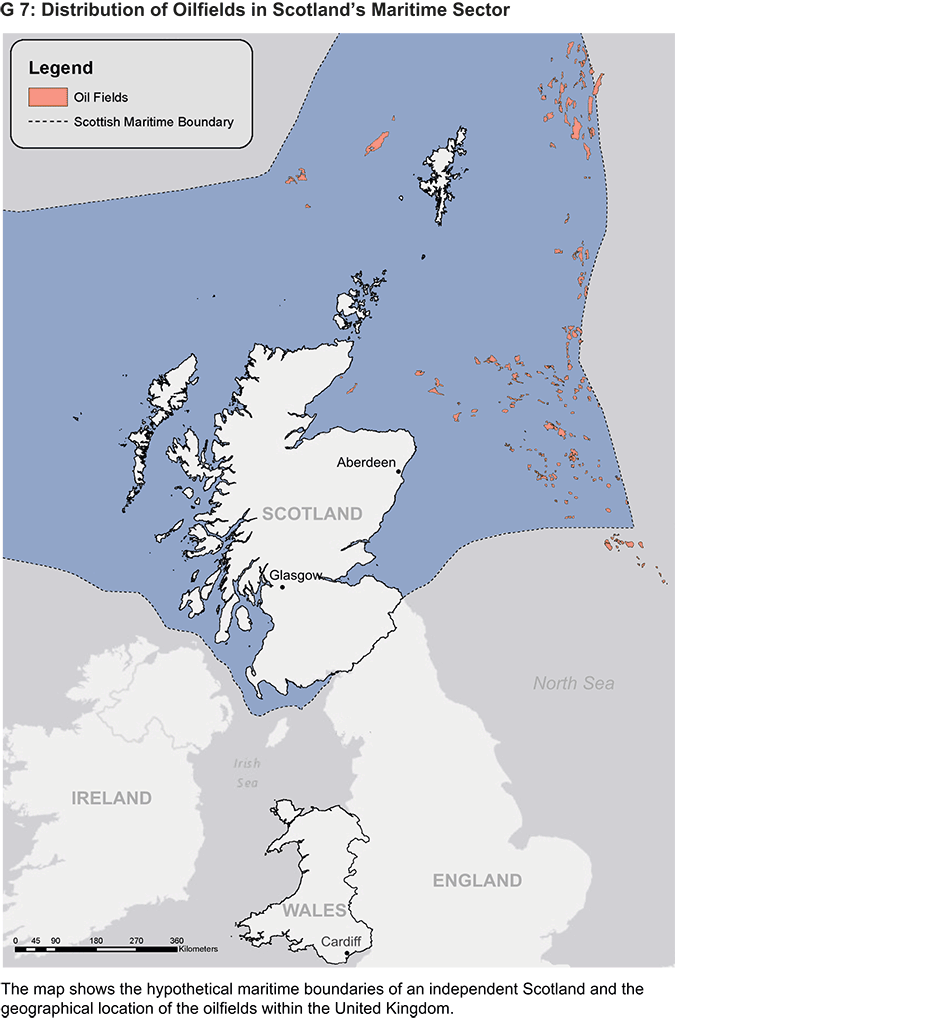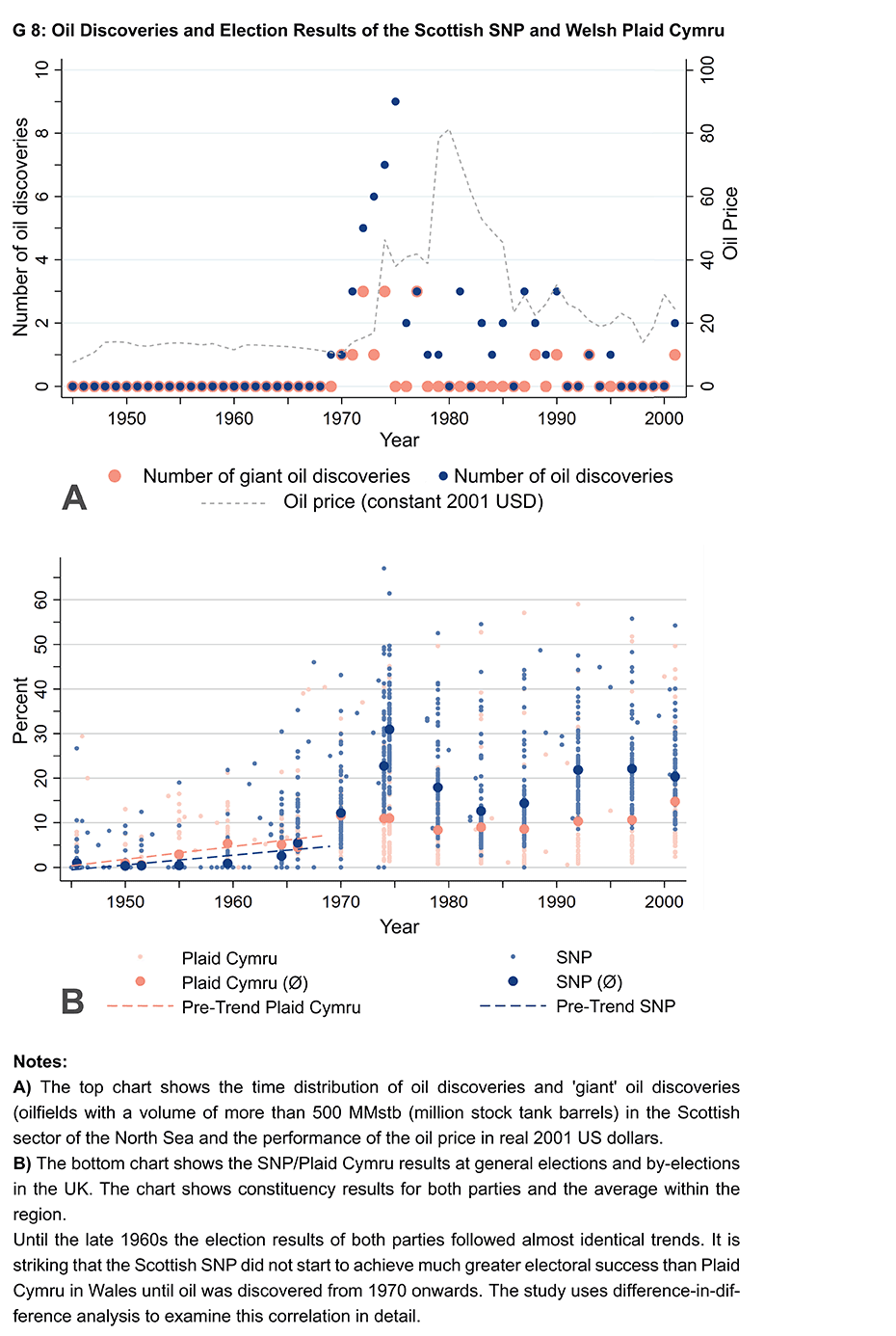The rise of the separatists: the impact of regional resources
- Europe
- KOF Bulletin
- World Economy
Brexit has put the issue of independence back on the political agenda in Scotland. This publication examines what economic factors reinforce separatist tendencies. Regional resource wealth plays a central role in this context. In particular, the analysis shows that oil discoveries have a causal effect on the electoral success of Scottish separatists.

There is currently hardly an area that does not appear to be affected by the coronavirus pandemic. This is also evident in Scotland: the Scottish Executive’s management of COVID-19, which is perceived to be better, appears to be conducive to reaching agreement on potential independence from the UK. In recent polls there is a clear majority in Scotland in favour of secession. More important than the coronavirus pandemic, however, is the issue of Brexit, which is opposed by a large majority in Scotland. The lack of a trade agreement at this stage and the real danger of a hard Brexit is all grist to the mill of Scottish nationalists, who have always warned of the consequences of Brexit for the Scottish economy. They would rather see Scotland in the EU and outside the UK.
Behind such beliefs lies the careful consideration of a multitude of different factors and preferences. As political economy research shows, regions weigh the advantages of being part of a larger nation against the disadvantages. Existing models have focused primarily on aspects such as economies of scale, access to markets, different local preferences and cultural factors. A recent publication by two researchers from KOF and the University of Zurich in the Journal of Public Economics now shows that there is one important reason for the strength of democratic separatist movements that has so far received too little attention: regional resource wealth.
Share of GDP correlates with growth in separatist votes
A key factor is the relative distribution of all regional resources that generate income for the public finances. The definition of resources here is not limited to mineral resources. Separatists in Istria (Croatia), for example, rely on its prosperity as a tourist region with numerous beaches. The impact of resource wealth on separatist movements can be clearly observed when the relative economic strength of a region changes. In the Flemish part of Belgium, for example, the increasingly successful electoral proponents of independence are benefiting from the growing economic strength of Flanders in international trade, while the old industrial region of Wallonia is struggling with structural change in the wake of globalisation.
If we look empirically at the relationship between a region’s share of the country’s gross domestic product (GDP) and the electoral success of separatist parties, a clear picture emerges: a 10 per cent increase in regional prosperity is associated with a rise of around 3 per cent in votes. Although this illustrates the importance of economic factors in connection with secessionist movements, it does not provide compelling evidence of a causal link.
Natural experiment: oil discoveries and the success of the Scottish separatists
The present study provides this evidence by drawing on a natural experiment in the United Kingdom. Both Scotland and Wales have had comparable separatist parties since the early 20th century: the Scottish National Party (SNP) and the Welsh Plaid Cymru. Until the late 1960s, both parties had few economic arguments for the independence of their regions and little success in elections. This changed in 1970 when, against all expectations, oil was found off the Scottish coast. The oilfields discovered subsequently formed part of the maritime sector, which would belong to an independent Scotland (see G 7).

The random timing of individual oil discoveries and the fact that a few huge oilfields account for a large part of the UK's revenue can be used as a natural experiment. Using difference-in-difference estimation, the authors determine the impact of oil discoveries on the separatists' share of votes. They also use exogenous changes in the world market price of oil as an additional variation in the value of the resources found.

The findings show that the SNP's share of votes increases by about two per cent after a major oil discovery (see G 8). This effect becomes more pronounced the higher the oil price and thus the greater the value of the oil found. A simple rough calculation shows that oil discoveries contributed 12 to 16 percentage points of the rise in votes – and, consequently, the improving fortunes – of the Scottish separatists in the 1970s.
Voters reacted to oil discoveries, but not to actual production or real revenues. This suggests that publicly visible events that are easy for everyone to understand are more conducive to separatist movements than more complicated issues. While cultural factors undoubtedly form an important basis for the existence of separatist movements, these research findings clearly show that in order to succeed, separatists need good economic arguments for the independence of their region.
Implications for the current situation in Europe
It is therefore not surprising that EU affinity is high in regions where independence movements are currently strong, such as Scotland and Catalonia. By staying in the European Union they would retain the advantages of being part of a larger economic entity with few trade barriers. At the same time, they could break away from what they see as the political paternalism of nation states. The Scottish separatists are therefore proposing immediate re-entry into the EU in the event of independence.
Such a fast-track procedure would, however, conflict with the strategic objectives of other national governments. Countries like Spain have a vested interest in making regional divisions look unappealing. As long as the external page influence of national interests on the EU Commission and the role of nation states as veto players in the European Union remain as strong as they have been, the Scottish government could not expect its advances for rapid re-entry into the EU to be officially reciprocated – or at least not without further long nights of negotiations in Brussels.
References
Gehring, Kai & Stephan A. Schneider (2020) Regional Resources and Democratic Secessionism. Journal of Public Economics 181. external page https://doi.org/10.1016/j.jpubeco.2019.104073
Contact
Professur f. Wirtschaftsforschung
Leonhardstrasse 21
8092
Zürich
Switzerland